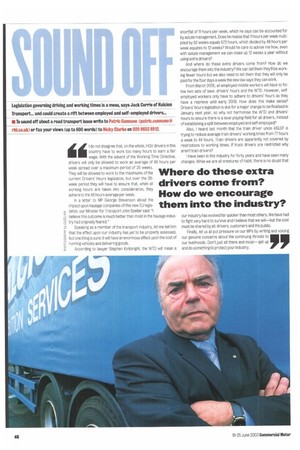6 I do not disagree that, on the whole, HGV drivers in this
Page 46

If you've noticed an error in this article please click here to report it so we can fix it.
country have to work too many hours to earn a fair wage. With the advent of the Working Time Directive, drivers will only be allowed to work an average of 48 hours per week spread over a maximum period of 26 weeks. They will be allowed to work to the maximums of the current Drivers' Hours legislation, but over the 26week period they will have to ensure that, when all working hours are taken into consideration, they adhere to the 48 hours average per week.
In a letter to MP George Stevenson about the impact upon haulage companies of this new EU legislation, our Minister for Transport John Speller said: "I ,., believe this outcome is much better than most in the haulage indus • try had originally feared."
L' Speaking as a member of the transport industry, let me tell him I that the effect upon our industry has yet to be properly assessed, cg but one thing is sure: it will have an enormous effect upon the cost of ■ If running vehicles and delivering goods. o a.According to lawyer Stephen Kirkbright, the WTD will mean a
shortfall of 11 hours per week, which he says can be accounted for by astute management. Does he realise that 11 hours per week multiplied by 52 weeks equals 572 hours, which divided by 48 hours per week equates to 12 weeks? Would he care to advise me how, even with astute management we can make up 12 weeks a year without using extra drivers?
And where do these extra drivers come from? How do we encourage them into the industry? We can tell them they'll be working fewer hours but we also need to tell them that they will only be paid for the four days a week the new law says they can work.
From March 2005. all employed mobile workers will have to follow two sets of laws: drivers' hours and the WTD. However, selfemployed workers only have to adhere to drivers' hours as they have a reprieve until early 2009. How does this make sense? Drivers' hours legislation is due for a major change to be finalised in January next year, so why not harmonise the WTD and drivers' hours to ensure there is a level playing-field for all drivers, instead of establishing a split between employed and self-employed?
Also, I heard last month that the train driver union ASLEF is trying to reduce average train drivers' working times from Ti hours a week to 44 hours. Train drivers are apparently not covered by restrictions to working times. If truck drivers are restricted why aren't train drivers?
I have been in this industry for forty years and have seen many changes. While we are all creatures of habit, there is no doubt that our industry has evolved far quicker than most others. We have had to fight very hard to survive and I believe that we will—but the cost must be shared by all: drivers, customers and the public.
Finally, let us all put pressure on our MPs by writing and voicing our genuine concerns about the continuing threats to our livelihoods. Don't just sit there and moan—get up and do something to protect your industry.














































































































































































